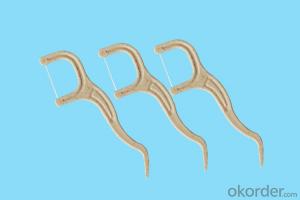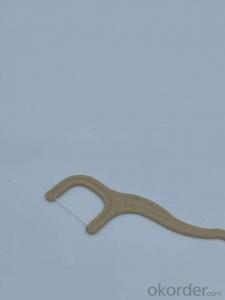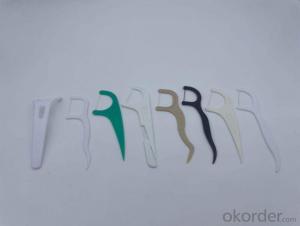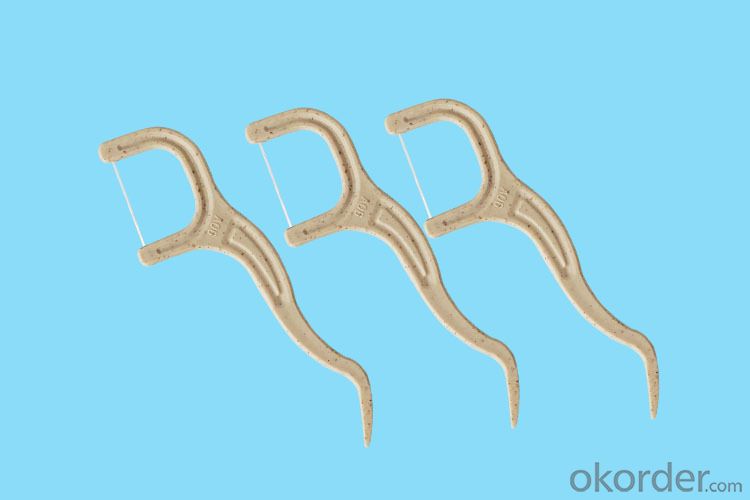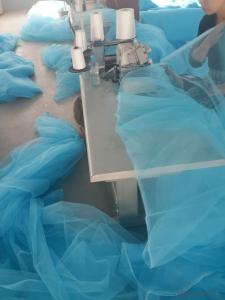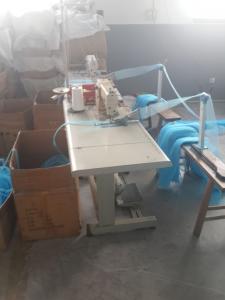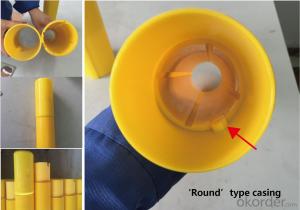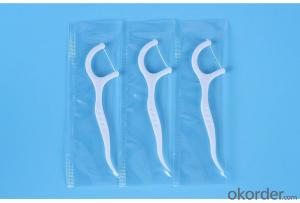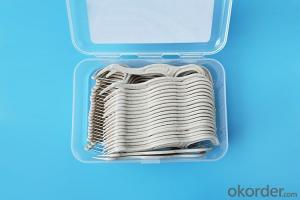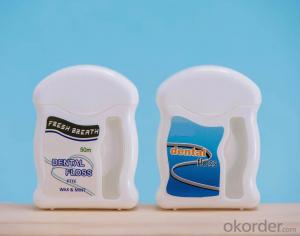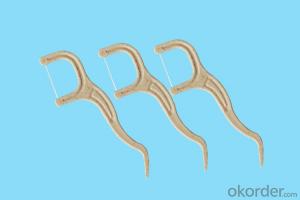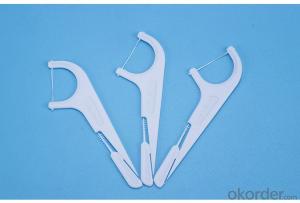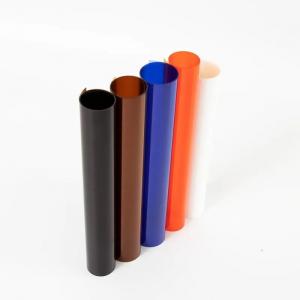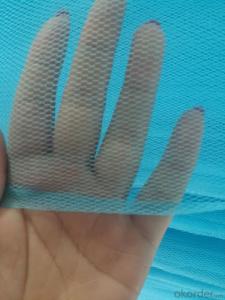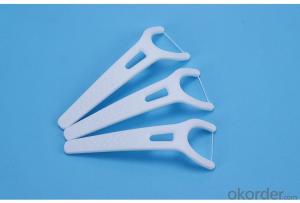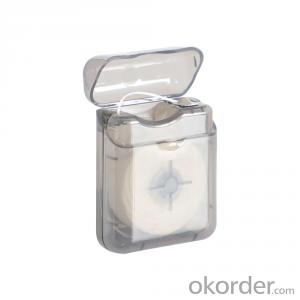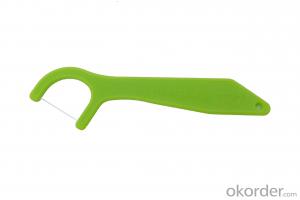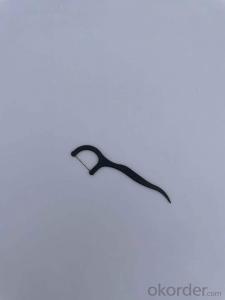Dental Floss Pick Bulk 50 pcs OEM Wheat Straw ECO Friendly Dental Floss
- Loading Port:
- Tianjin
- Payment Terms:
- TT OR LC
- Min Order Qty:
- 200 bag
- Supply Capability:
- 100000 bag/month
OKorder Service Pledge
OKorder Financial Service
You Might Also Like
Specification
Dental Floss Pick Bulk 50 pcs OEM Wheat Straw ECO Friendly Dental Floss
| Brand | OEM/Ok Floss |
| Floss material | UHMWPE+ wheat Straw |
| Floss length | 7.4*2.2cm/OEM |
| Wax | Import germany wax/american wax/bee wax/candelilla wax/customized wax |
| Flavor | Mint / green tea / lemon / peach / fruit / aloe / gin |
| Color | Floss original color |
| Floss original color | Individual bulk PP bag/individual paper box/as customized |
| Applications | Family,Hotel,Travel,Supermarket |
| Delivery | By sea,By air,By express. |
| Lead time | 20-30days |
Soft tape to ace the tight space
No break, no shred floss
Helps remove plaque between teeth
Helps prevent gingivitis between teeth
Unique handle design, makes it easy and comfortable to floss. Removes trapped food debris.
Extra bristled pick for hard to get bits,even gets behind hard-to-reach molars.
Gently slides smooth between tight teeth. Freshen breath with flavor.
Recommends you use OK flosser after every meal and snack to have a fresher, cleaner mouth. For a completely daily clean, use with a OK flosser to easily reach back teeth.
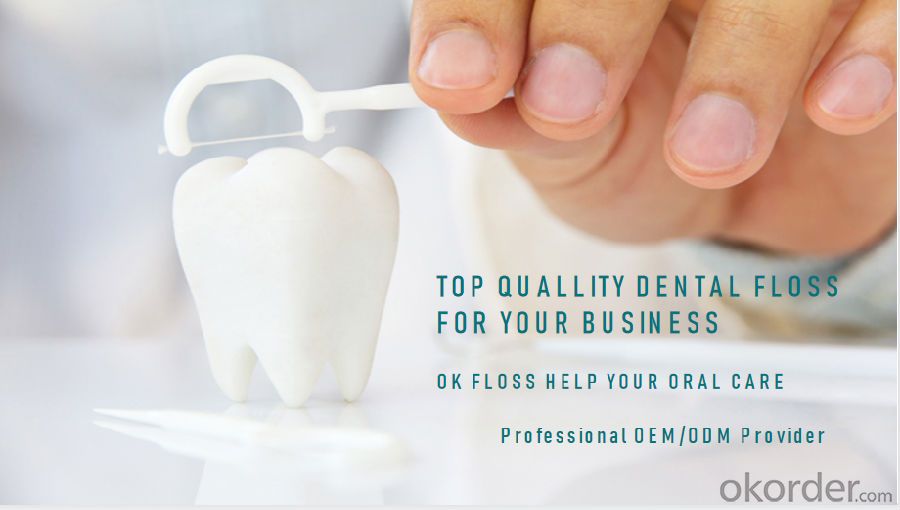

 Why we need use dental floss ?
Why we need use dental floss ?
Because it can reduce your chances of 60% of
adjacent dental caries and 70% of periodontal
disease.
It allows you to have a healthy tooth of your own at
the age of 80.
Flossing your teeth in the right way will remove
food particles and growing plaque from spots
where your toothbrush can’t reach, generally
between your teeth and under the gumline.
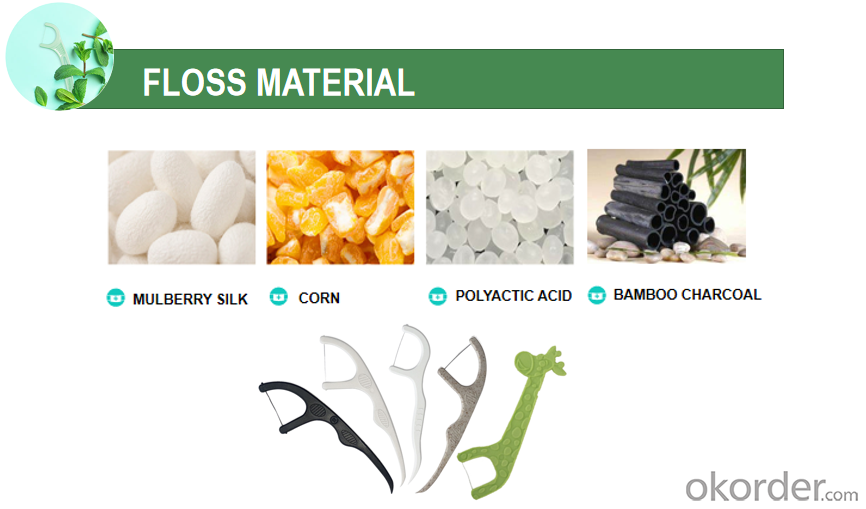
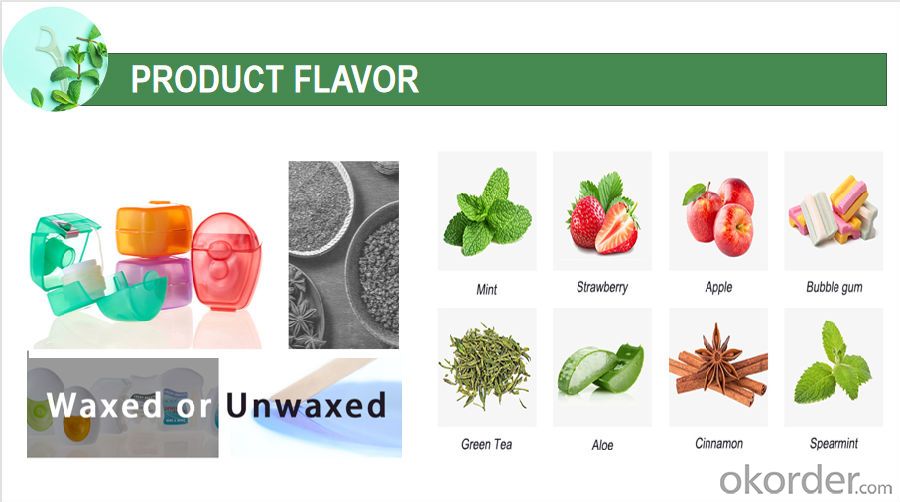
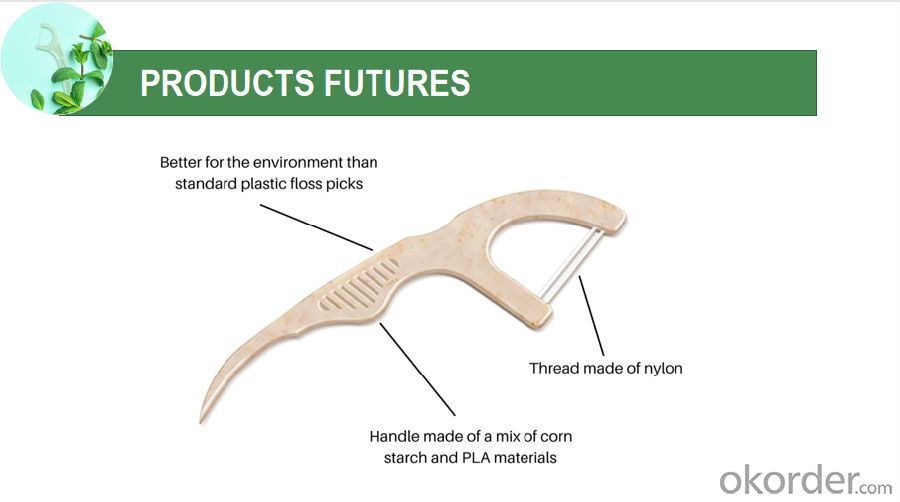
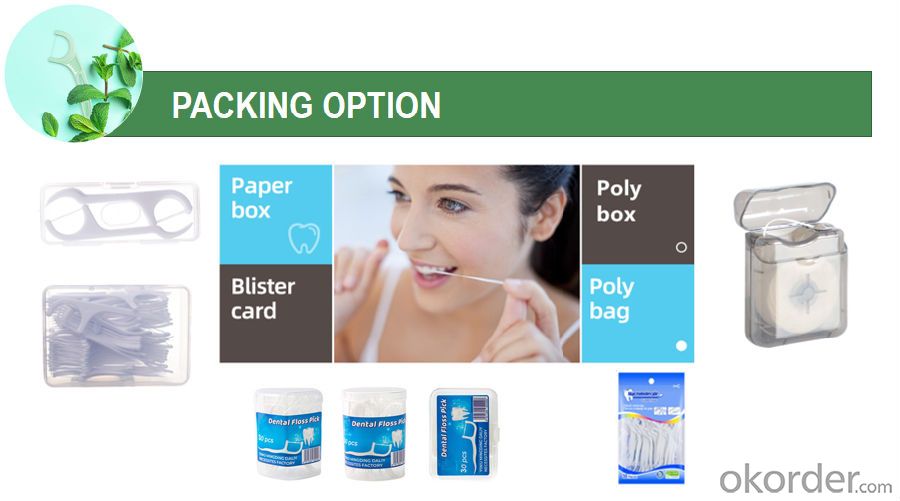

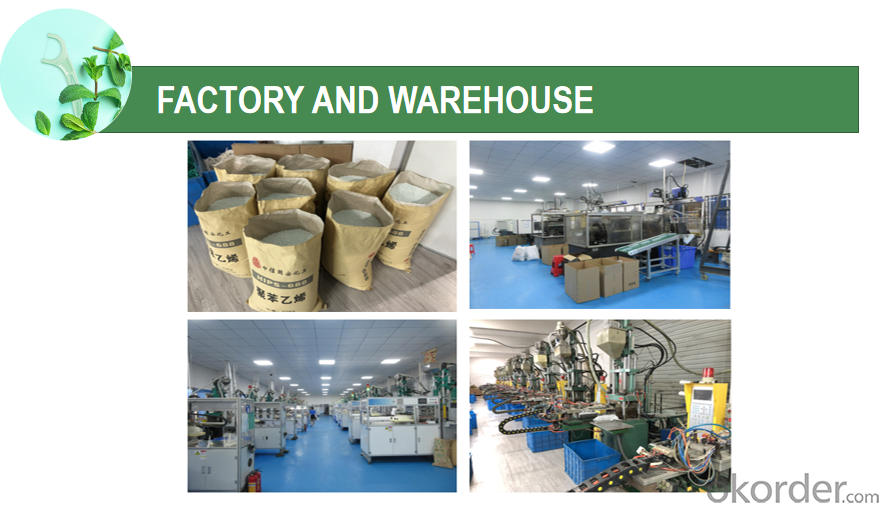
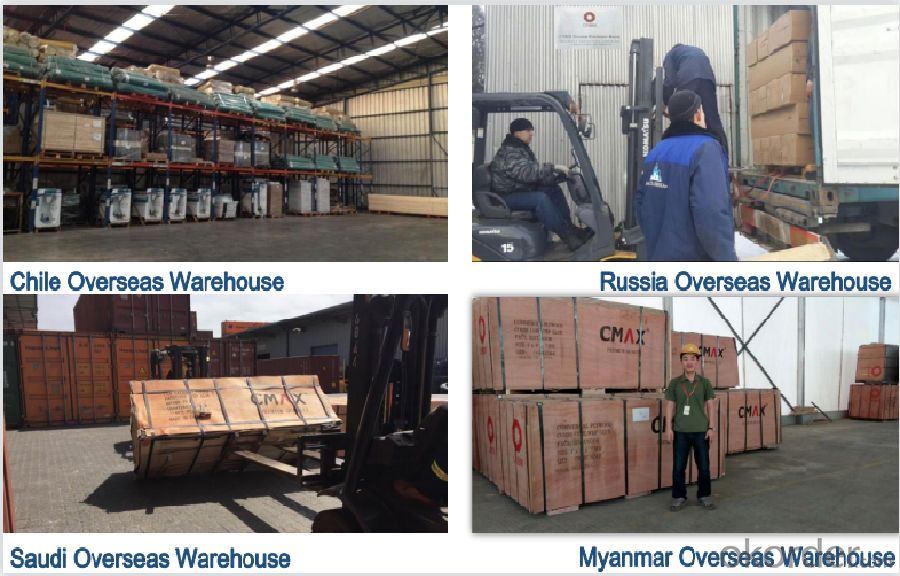
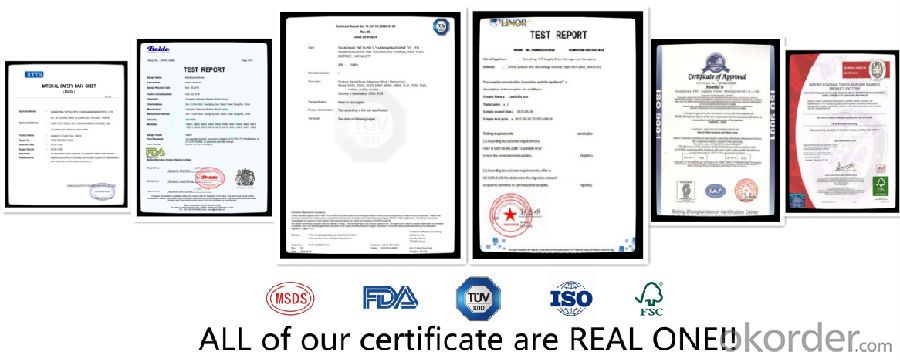
Suggested use
Directions for flossing: While holding the handle, gently guide the floss between your teeth using a zig-zag motion. Move floss away from the gumline in a gentle back and forth, up and down motion alongside each tooth to remove food particles and plaque. Rinse floss as needed and repeat for each tooth.
Warnings
Adult supervision recommended under age 10.
FAQ
Q: Can you accept OEM make?
A: Sure.We can make your customized brand and design blister card, inner box and master carton, and also pack as per your request.
2. Q: Where can I put my logo?
A: We can print your logo on the sticker, blister card, inner box and master carton.
3. Q: What are your MOQ?
A: Blister card packing: 10000 pcs/item.
Bulk packing: 5000 pcs/item.
4. Q: How can I get Samples?
A: Samples are free, while the shipping cost to be collected.
5. Q: What are your terms of payment?
A: 1) T/T(30% in advance, the balance by the copy of B/L).
2)For small order less than USD 3000, in order to save bank commision for both of us, we need 100% in advance.
6. Q: How long is the delivery time?
A: For the MOQ, the leading time is about 20-30 days.
- Q: How do medical plastics contribute to the development of point-of-care testing?
- Medical plastics play a crucial role in the development of point-of-care testing by providing a versatile and cost-effective material for manufacturing diagnostic devices. These plastics allow for the production of disposable and portable testing tools, such as microfluidic chips and test strips, that can be used at the point of care, eliminating the need for laboratory testing. The use of medical plastics in these devices ensures accurate and reliable test results, while also enabling easy sterilization and preventing contamination. Additionally, medical plastics can be molded into complex shapes, allowing for the integration of multiple functions and components in a single device, further enhancing the capabilities and efficiency of point-of-care testing.
- Q: Are there any specific disposal requirements for medical plastics?
- Yes, there are specific disposal requirements for medical plastics. These requirements vary depending on the type of medical plastic waste and local regulations. Generally, medical plastics should be segregated from other waste streams and disposed of through proper channels, such as incineration, autoclaving, or recycling, to prevent environmental contamination and ensure the safety of healthcare workers and the public.
- Q: What are the safety regulations for medical plastic?
- Safety regulations for medical plastic vary depending on the specific use and intended application. However, common safety regulations include compliance with medical device regulations, such as ISO 10993 for biocompatibility, and adherence to quality control standards, such as ISO 13485 for medical devices. Other considerations may include sterilization compatibility, chemical resistance, and material composition guidelines to ensure the safety and effectiveness of medical plastic products.
- Q: How does medical plastic contribute to the development of personalized prosthetics?
- Medical plastic plays a crucial role in the development of personalized prosthetics by providing a versatile and customizable material for creating prosthetic components. Its unique properties, such as durability, flexibility, and biocompatibility, allow for the creation of prosthetics that are tailored to an individual's specific needs and preferences. Medical plastic can be easily molded and shaped into intricate designs, facilitating the production of prosthetic limbs that closely mimic the natural movements and appearance of real limbs. Additionally, the lightweight nature of medical plastic makes the prosthetics more comfortable to wear, enhancing mobility and overall quality of life for individuals in need of prosthetic solutions.
- Q: Can medical plastic be safely used in veterinary applications?
- Yes, medical plastic can be safely used in veterinary applications. It is commonly used in various veterinary medical devices and equipment such as syringes, catheters, and surgical instruments. Medical-grade plastics are designed to be biocompatible, meaning they are non-toxic, non-reactive, and do not cause any adverse reactions in animals. These plastics meet strict safety and quality standards to ensure their suitability for veterinary use.
- Q: Are there any restrictions on the use of medical plastics?
- Yes, there are restrictions on the use of medical plastics. These restrictions are in place to ensure the safety and effectiveness of medical devices and equipment. Regulatory bodies, such as the Food and Drug Administration (FDA), set guidelines and standards that medical plastics must meet to be used in healthcare settings. These regulations cover aspects such as biocompatibility, sterilization, chemical resistance, and durability to ensure patient safety and maintain the integrity of medical devices.
- Q: How does medical plastic contribute to the development of bioreactors?
- Medical plastic plays a crucial role in the development of bioreactors by providing a sterile and biocompatible environment for cell cultures. It allows for the controlled growth and expansion of cells, facilitating various applications such as tissue engineering, drug testing, and regenerative medicine. Additionally, medical plastic offers flexibility in design, allowing for the creation of complex structures and channels within bioreactors that enhance nutrient and waste exchange, ensuring optimal cell growth and functionality.
- Q: How does medical plastic contribute to the development of tele-dermatology technologies?
- Medical plastic plays a crucial role in the development of tele-dermatology technologies by enabling the production of lightweight, durable, and sterile equipment and devices. From the creation of specialized cameras and imaging devices to the development of tele-health platforms, medical plastic ensures the safety and effectiveness of tele-dermatology tools. Its properties allow for easy disinfection and maintenance, while also facilitating the transmission of high-quality images and data remotely, ultimately improving patient care and increasing access to dermatological services.
- Q: Are medical plastics resistant to electrical conductivity?
- Yes, medical plastics are typically resistant to electrical conductivity.
- Q: Are there any concerns about the long-term safety of medical plastics?
- Yes, there are concerns about the long-term safety of medical plastics. While medical plastics have greatly contributed to advancements in healthcare, there are worries about their potential adverse effects on human health and the environment. Some concerns include the leaching of harmful chemicals into medical devices or medications, the accumulation of microplastics in the body, and the persistence of plastic waste in ecosystems. Extensive research and regulation are necessary to address these concerns and ensure the long-term safety and sustainability of medical plastics.
Send your message to us
Dental Floss Pick Bulk 50 pcs OEM Wheat Straw ECO Friendly Dental Floss
- Loading Port:
- Tianjin
- Payment Terms:
- TT OR LC
- Min Order Qty:
- 200 bag
- Supply Capability:
- 100000 bag/month
OKorder Service Pledge
OKorder Financial Service
Similar products
Hot products
Hot Searches
Related keywords
